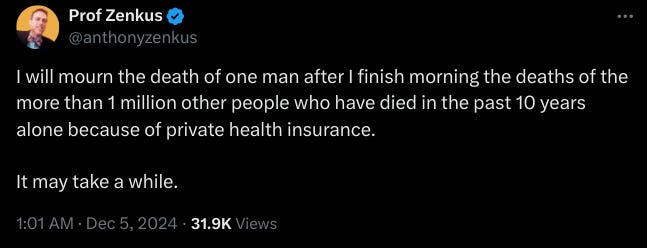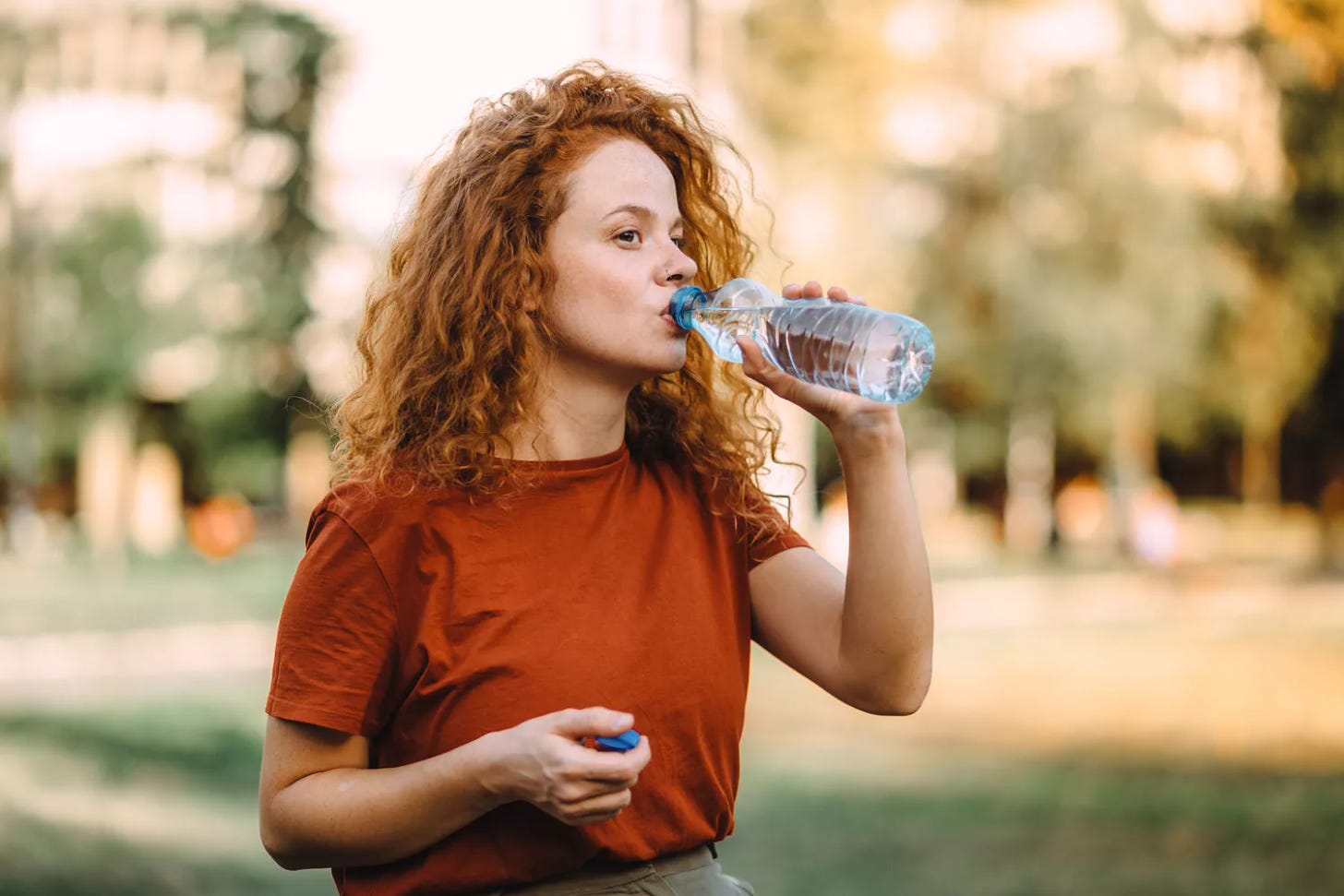The first theme of today’s links is the one word Mr. McGuire wants Benjamin Braddock, the graduate of the well-known film, to remember.
Are you listening? “Plastics.”
Our second theme is “shareholder value,” which has been given new relevance lately:
Plastic bottles, plastic lives, and profit. ‘Nuff said?
Links
• Microplastics found in human blood for first time (The Guardian, 2022; archived here)
Microplastic pollution has been detected in human blood for the first time, with scientists finding the tiny particles in almost 80% of the people tested.
The discovery shows the particles can travel around the body and may lodge in organs. The impact on health is as yet unknown. But researchers are concerned as microplastics cause damage to human cells in the laboratory and air pollution particles are already known to enter the body and cause millions of early deaths a year.
Huge amounts of plastic waste are dumped in the environment and microplastics now contaminate the entire planet, from the summit of Mount Everest to the deepest oceans. People were already known to consume the tiny particles via food and water as well as breathing them in, and they have been found in the faeces of babies and adults.
File under “You are the dumping ground.”
• Microplastics are infiltrating brain tissue, studies show: ‘There’s nowhere left untouched’ (The Guardian, 2024; archived here)
A growing body of scientific evidence shows that microplastics are accumulating in critical human organs, including the brain, leading researchers to call for more urgent actions to rein in plastic pollution.
Studies have detected tiny shards and specks of plastics in human lungs, placentas, reproductive organs, livers, kidneys, knee and elbow joints, blood vessels and bone marrow.
Given the research findings, “it is now imperative to declare a global emergency” to deal with plastic pollution, said Sedat Gündoğdu, who studies microplastics at Cukurova University in Turkey.
However, there are “currently no governmental standards for plastic particles in food or water in the United States.” Think that will change?
File under “Wait till they find out what this stuff really does.”
• Microplastics found in every human placenta tested in study (The Guardian, 2024; archived here)
Microplastics have been found in every human placenta tested in a study, leaving the researchers worried about the potential health impacts on developing foetuses.
The scientists analysed 62 placental tissue samples and found the most common plastic detected was polyethylene, which is used to make plastic bags and bottles. A second study revealed microplastics in all 17 human arteries tested and suggested the particles may be linked to clogging of the blood vessels.
Microplastics have also recently been discovered in human blood and breast milk, indicating widespread contamination of people’s bodies. The impact on health is as yet unknown but microplastics have been shown to cause damage to human cells in the laboratory. The particles could lodge in tissue and cause inflammation, as air pollution particles do, or chemicals in the plastics could cause harm.
Also:
Huge amounts of plastic waste are dumped in the environment and microplastics have polluted the entire planet, from the summit of Mount Everest to the deepest oceans. People are known to consume the tiny particles via food and water as well as breathing them in, and they have been found in the faeces of babies and adults.
File under “You should feel important. Every breath creates shareholder value.”
The average liter of bottled water contains a quarter of a million pieces of microscopically small plastic — and the researchers who made this discovery have said that although it might not be dangerous, it’s made them cut back on how much bottled water they drink.
With laser-powered microscopes, researchers analyzed samples from three brands of bottled water and discovered that a liter contained 110,000 to 400,000 pieces of plastic per liter.
That’s an average of about 240,000 miniscule [sic] particles of plastic, according to their findings, which were published in the Proceedings of the National Academy of Sciences.
Not microplastics, nanoplastics:
The study authors said that 90% of the plastic pieces were not microplastics, but nanoplastics, which are even smaller than microplastics, and “believed to be more toxic since their smaller size renders them much more amenable, compared to microplastics, to enter the human body,” the study said.
Nanoplastics are small. There are 10 million nanometers in a centimeter (about ⅜ of an inch).
What do the scientists think after learning this?
Their findings have made the researchers say they’re cutting back on bottled water: Stapleton told NBC News that she’s relying on filtered tap water now, and her colleague Wei Min, a chemist, said he’s reduced his bottled water consumption.
But as study co-author, chemist Beizhan Yan, shared, “there’s just no win” as water filtration systems can introduce microplastics into the water supply.
File under “Resistance is futile.”
• Big Oil’s Evil, Stupid Plan to Drown the World in Plastic (Kate Aronoff)
The International Energy Agency has found that petrochemicals accounted for 14 percent of world oil demand in 2017. Prior to Covid-19, the agency projected that plastics alone—which account for about two-thirds of the petrochemicals industry—would make up 45 percent of the growth in oil demand in the coming decades. BP’s widely cited annual energy outlook was even more bullish, expecting plastics to account for a whopping 95 percent of net oil demand growth through 2040.
These kinds of rosy projections helped inspire the build-out happening now. During the last oil price crash in 2015, both privately owned and state-owned oil companies invested in plastic and other so-called midstream assets, since they seemed more insulated from market volatility than high-cost production schemes like fracking, offshore drilling, and tar sands. Developing countries’ ballooning gross domestic product promised to boost demand for plastics of all kinds, from the kind of single-use plastics used in packaging to those found in durable goods like cars.
This is the kahuna, the plan never to stop. Because money.
File under “At least someone benefits, so there’s that.”
Music
This is not quite music, unless dialog counts as song, but I can’t close without showing the iconic scene previewed at the top. As you listen, pay attention to Dustin Hoffman’s pauses and deadpan delivery of lines like “Yes I am” and “Yes I will” (as opposed the simpler “Yes”); also, earlier in the scene, in the almost snarky repeated sequence:
Ben.
Mr. McGuire.
Ben.
Mr. McGuire.
Both Hoffman and Buck Henry, the film’s primary screenwriter, convey Ben’s disrespect-verging-on-hatred of these people, whose minds are as generic and “plastic” as their lives. The entire film is about Ben escaping their lives.
Here’s the song “Mrs. Robinson” with an explanation. Enjoy.








Start liking it.
We'd inspect power station boilers, 145' up amongst the superheater tubes or crawl 80-200' of large diameter pipe to check girth weld discontinuities & our masks were clean. I'd masked in our building's laundry as COVID first got us & curiosity got the best of me. You guessed it? Without the driers on, window top cracked 3-4" & few folks aware; Polartec, Primaloft & CoolMax are fracking byproducts. I've used NIOSH & KF-94 ever since.